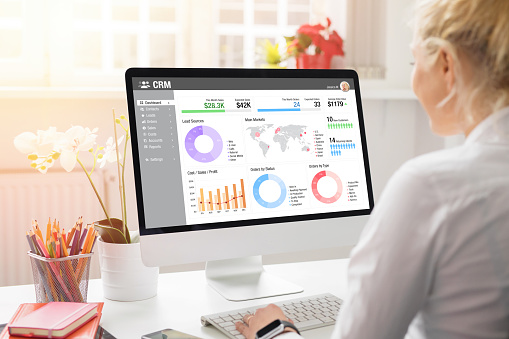For small Businesses, customer relationship management (CRM) software can be the key to success. The right CRM system can help streamline business processes, improve customer interactions, and even boost sales. But with so many CRM software options on the market, how can you make the right choice for your business? In this blog post, we’ll explore the importance of CRM for small businesses, the benefits it offers, and how to compare CRM software using charts and matrices.
Why CRM is needed for Small Businesses?
CRM systems are essential for small businesses because they provide a centralized platform to manage customer information, sales, and marketing efforts, and small businesses often struggle with limited resources, making it critical to maximize efficiency and productivity.
CRM software enables Businesses to:
- Organize Customer Data:
By consolidating customer information into a single platform, CRM systems help small businesses maintain accurate and up-to-date records. This makes it easier to track customer interactions, preferences, and history.
- Streamline Sales and Marketing Efforts:
Implementing CRM software for small businesses can yield numerous benefits, including enhanced productivity, improved customer retention, increased sales, better decision-making, scalability, better customer segmentation, enhanced collaboration and communication, forecasting and analytics, automation of repetitive tasks, improved lead management, and increased customer satisfaction
- Improve Customer Service:
CRM systems enable small businesses to deliver personalized and attentive customer service, which can lead to improved customer satisfaction and loyalty.
What are the Benefits of Using a CRM for Growing Your Business?

Implementing CRM software for small businesses can yield numerous benefits, including:
- Enhanced Productivity:
With centralized access to customer data, employees can quickly find the information they need, leading to increased productivity and more time spent on revenue-generating activities.
- Improved Customer Retention:
By providing personalized and timely customer service, small businesses can foster long-term relationships with customers, leading to increased loyalty and retention.
- Increased Sales:
CRM systems enable small businesses to identify new sales opportunities, track leads, and monitor the sales pipeline more effectively, resulting in higher close rates.
- Better Decision-making:
CRM software provides valuable insights into customer behaviour, preferences, and trends, enabling small businesses to make informed decisions and adjust their strategies accordingly.
- Scalability:
As your business grows, CRM systems can be easily expanded to accommodate new customers, employees, and processes, ensuring seamless integration and continued success.
- Better Customer Segmentation:
CRM systems allow you to categorize and segment your customers based on various criteria, such as demographics, purchasing history, and interactions. This enables targeted marketing campaigns and tailored customer experiences, resulting in increased engagement and higher conversion rates.
- Enhanced Collaboration and Communication:
A collaborative CRM system can improve communication and teamwork across departments. By providing real-time access to customer data and a shared platform for tracking interactions, your sales, marketing, and customer service teams can work together more efficiently and effectively.
- Forecasting and Analytics:
CRM software often includes built-in analytics and reporting tools, allowing you to forecast sales trends, measure campaign effectiveness, and track key performance indicators (KPIs). This information can help you optimize your strategies and make data-driven decisions to support business growth.
- Automation of Repetitive Tasks:
CRM systems can automate a variety of routine tasks, such as sending follow-up emails, scheduling appointments, and updating customer records. This frees up valuable time for your team to focus on more important, revenue-generating activities.
- Improved Lead Management:
CRM software streamlines the lead management process, making it easier to capture, qualify, and nurture leads. With better tracking and organization of leads, your sales team can focus on converting prospects into customers more efficiently.
- Increased Customer Satisfaction:
By offering personalized and prompt customer service, CRM systems help you meet and exceed customer expectations. Satisfied customers are more likely to become repeat customers and refer your business to others, contributing to overall growth.
In summary, using a CRM system can greatly benefit your small business by improving productivity, enhancing customer relationships, and providing valuable insights for decision-making. By leveraging these benefits, you can foster business growth and stay ahead of the competition.

How to Compare CRM Software for Small Businesses, Including Chart and Matrix?
To choose the right CRM software for your small business, consider using a comparison chart or matrix to evaluate different options, determine your needs, create a list of potential CRM software, develop a comparison chart or matrix, rate each CRM software, analyze the results, schedule demos and trials, seek input from your team, consider scalability and flexibility, evaluate user interface and ease of use, assess the quality of customer support, and read reviews and testimonials.
- Determine Your Needs:
Before comparing CRM systems, identify your business’s unique needs and priorities. This might include specific features, integrations, or pricing considerations.
- Create a List of Potential CRM Software:
Research and compile a list of CRM software options that cater to small businesses. Ensure these options meet your basic requirements and offer the features you need.
Comparing CRM Software
To choose the right CRM software, consider the following factors:
- Pricing Structure
- Customization Options
- Collaborative CRM System Features
- Integrations with Other Software
- User-friendliness
- Customer Support and Training Resources
- Rate Each CRM Software:
Assign a rating or score to each CRM option based on the criteria you’ve outlined in your chart or matrix. This will help you assess how well each CRM system meets your needs and enable you to make an informed decision.
- Analyse the Results:
Review your chart or matrix to identify the CRM software that stands out as the best fit for your business. Consider which option offers the right balance of features, pricing, and support for your specific needs. Remember that no CRM system will be perfect, but the goal is to find the one that best aligns with your business objectives.
- Schedule Demos and Trials:
Before making a final decision, request demos and trials from the top contenders on your list. This will give you a better understanding of the user experience and functionality of each CRM software, allowing you to make a more informed choice.
- Seek Input from Your Team:
Involve your team in the decision-making process, as they will be using the CRM system daily. Gather their feedback on each option to ensure the CRM software you choose is user-friendly and meets the needs of all departments.
- Consider Scalability and Flexibility:
As your business grows, you may need to add more users, manage larger volumes of customer data, or require additional features. Ensure that the CRM software you choose can easily scale with your business and adapt to changing needs without incurring excessive costs or causing disruptions.
- Evaluate User Interface and Ease of Use:
An intuitive, user-friendly interface is essential for smooth adoption and usage across your team. When comparing CRM systems, consider the learning curve, navigation, and overall user experience to ensure that your team can quickly become proficient with the software.
- Assess the Quality of Customer Support:
Strong customer support is crucial, especially for small businesses that may not have dedicated IT staff. When comparing CRM options, consider the availability, responsiveness, and quality of customer support offered by each provider. Look for options that provide multiple support channels, such as email, phone, and live chat, as well as self-help resources like tutorials and FAQs.
- Read Reviews and Testimonials:
Customer reviews and testimonials can provide valuable insights into the real-world performance and user experience of CRM software. Look for unbiased reviews on third-party websites or ask for referrals from other businesses in your industry to gauge the reputation and reliability of each CRM system.
Conclusion
Selecting the right CRM software is crucial for small businesses. By understanding the benefits, identifying specific needs, and comparing options, businesses can make an informed decision that drives growth and success. Take the time to explore CRM software options and find the perfect fit for your business.
